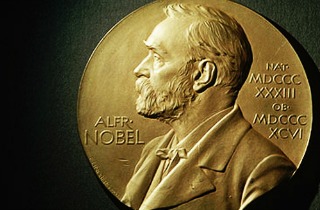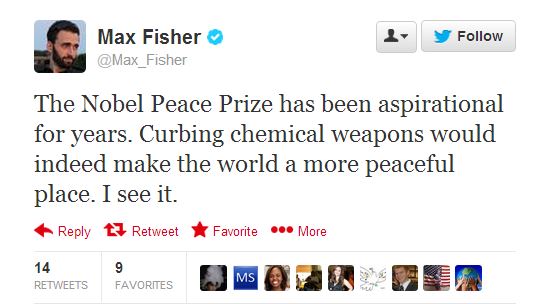 The Organisation for the Prohibition of Chemical Weapons, the group tasked with affecting the half-baked “solution” to the Syrian civil war and preventing the regime in Damascus from again using chemical weapons, was awarded the Nobel Peace Prize on Thursday. That group has the unenviable mission of inspecting for and disposing of one of the largest chemical weapons stockpiles on earth in the midst of a civil war. Few experts believe they can accomplish this task – few, it would appear, save for the Nobel Peace Prize Committee.
The Organisation for the Prohibition of Chemical Weapons, the group tasked with affecting the half-baked “solution” to the Syrian civil war and preventing the regime in Damascus from again using chemical weapons, was awarded the Nobel Peace Prize on Thursday. That group has the unenviable mission of inspecting for and disposing of one of the largest chemical weapons stockpiles on earth in the midst of a civil war. Few experts believe they can accomplish this task – few, it would appear, save for the Nobel Peace Prize Committee.
What a joke. The philosophers in Oslo might have devoted hours of deliberation to the nomination of Russian President Vladimir Putin. His worthy achievement was to provide President Barack Obama with a politically beneficial, short-term solution to the crisis of potentially having to act on his own pronouncements. But Moscow’s active repression of dissidents and the mysterious and regular disappearance of journalists in Russia stayed the committee members’ hands.
So, the Nobel Committee did the next best thing – they cast their favor upon the executors of the so-called peace process in Syria. But the arrangement hashed out by removed diplomats in European capitals is anything but a peace process. The threat of military action against Bashar al-Assad temporarily stayed his hand, but the “resolution” of the crisis has given him the green light to prosecute his war against rebel factions and the civilians loyal to them with even more abandon. The effort to achieve peace in Syria has amounted to a license for more war, more bloodshed. The conflagration of that conflict across Syria’s borders appears likely.
The prize has become entirely aspirational. The prize committee committed to awarding the peace prize to the OPCW in a naked effort to reaffirm their past decisions when they awarded the prize to institutions and individuals which hold promise but have no real accomplishments.
And yet, the prize committee has its defenders. Some, like Washington Post foreign affairs blogger Max Fisher, see the virtue in awarding the prize to institutions which embody the committee’s best hopes:

And if you only dream hard enough, you can too.
The Nobel Prize in any field but “peace” is awarded for achievements. Triumphs and successes have the ugly tendency to be self-evident and immutable. They either exist or they do not. But this binary dynamic is far too rigid for the intellectual caste in Norway. They can “see” it, and so could you if you would only surrender your fatuous attachment to empiricism.
Al Gore, Barack Obama, the European Union – all embody the promise of an ideology to which the committee members ascribe. The promotion of that ideology apparently trumps the committee’s stated purpose: recognizing “the person who shall have done the most or the best work for fraternity between nations, for the abolition or reduction of standing armies and for the holding and promotion of peace congresses.”
In order to make political points, thumbing their nose at rational and reasonable critics of the committee’s decisions over the past half-decade, the prize committee passed over Malala Yousafzai. At only 16, Yousafzai has become a symbol for women around the world living under regimes and in cultures that repress young women like her. After being shot in the head by Taliban rebels, Malala survived and now preaches peace. By surviving, she has won. By forgiving her attackers, she has shown magnanimity. Yousafzai is a truly special person.
Her very existence demonstrates the impotence of the forces of regression and oppression. But her survival and commitment to the cause of self-determination is also a testament to the beneficence of American military strength. She was attacked by the remnants of a regime toppled by the United States and its NATO allies under President George W. Bush – a regime which, if it were still in place, would have robbed the world of Yousafzai’s light. To elevate her to prominence is to tacitly endorse the war in Afghanistan. To acknowledge her accomplishments is to confirm that war yields victories which benefit humanity. This cannot be.
Thus, the petulant prize committee made the decision to further dilute the significance of the already transparently political Nobel Peace Prize.
One day, and it may not be far off, the prize committee will select as their recipient of the prize an individual of accomplishment who is worthy of the prize. That person, proving that they are indeed worthy of the accolades of mankind, will refuse this tainted and dubious honor.
[Photo via Eric Arnold]
— —
> >Follow Noah Rothman (@NoahCRothman) on Twitter
This is an opinion piece. The views expressed in this article are those of just the author.






